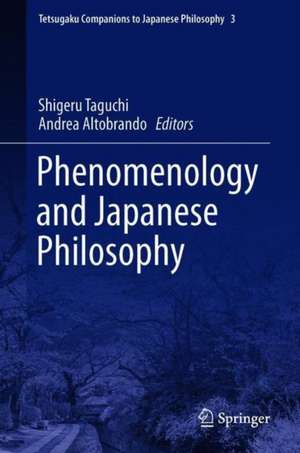Tetsugaku Companion to Phenomenology and Japanese Philosophy: Tetsugaku Companions to Japanese Philosophy, cartea 3
Editat de Shigeru TAGUCHI, Andrea ALTOBRANDOen Limba Engleză Hardback – 30 ian 2020
| Toate formatele și edițiile | Preț | Express |
|---|---|---|
| Paperback (1) | 888.97 lei 6-8 săpt. | |
| Springer International Publishing – 26 aug 2021 | 888.97 lei 6-8 săpt. | |
| Hardback (1) | 692.04 lei 38-44 zile | |
| Springer International Publishing – 30 ian 2020 | 692.04 lei 38-44 zile |
Preț: 692.04 lei
Preț vechi: 910.59 lei
-24% Nou
Puncte Express: 1038
Preț estimativ în valută:
132.44€ • 137.76$ • 109.34£
132.44€ • 137.76$ • 109.34£
Carte tipărită la comandă
Livrare economică 10-16 aprilie
Preluare comenzi: 021 569.72.76
Specificații
ISBN-13: 9783030219413
ISBN-10: 3030219410
Pagini: 336
Ilustrații: IX, 262 p. 10 illus.
Dimensiuni: 155 x 235 mm
Greutate: 0.56 kg
Ediția:1st ed. 2019
Editura: Springer International Publishing
Colecția Springer
Seria Tetsugaku Companions to Japanese Philosophy
Locul publicării:Cham, Switzerland
ISBN-10: 3030219410
Pagini: 336
Ilustrații: IX, 262 p. 10 illus.
Dimensiuni: 155 x 235 mm
Greutate: 0.56 kg
Ediția:1st ed. 2019
Editura: Springer International Publishing
Colecția Springer
Seria Tetsugaku Companions to Japanese Philosophy
Locul publicării:Cham, Switzerland
Cuprins
Chapter 1. Introduction: On the originality and the fruitfulness of the encounter between phenomenology and Japanese philosophy (ALTOBRANDO and TAGUCHI).- Part I – Nishida and the Encounter with Phenomenology in Japan.- Chapter 2. Nishida’s “Immanent” Philosophy of “Consciousness as Nothingness” (ITABASHI) .- Chapter 3. On the Negation-based Structure of “Acting-Self-awareness”: The Development of Nishida’s Phenomenological Thought (TANGI).- Chapter 4. Nishida Kitarō and Phenomenology (CHEUNG).- Part 2. Japanese Philosophy and Phenomenology of Self-awareness.- Chapter 5. Nishida and the Phenomenology of Self-Awareness (MARALDO).- Chapter 6. Heidegger and Nishida’s Transformations of Transcendental Reflection (ISHIHARA).- Part 3. Japanese Philosophy and Phenomenology of Alterity.- Chapter 7. Consciousness Without Boundaries? The Riddle of Alterity in Husserl and Nishida (TAGUCHI).- Chapter 8. Phenomenology touching its limits. Tanabe and Lévinas in 1934 (SUGIMURA).- Part 4. Japanese Ethics and Phenomenology of Intersubjectivity.- Chapter 9. Tomoo Otaka’s Conception of Sovereignty as Nomos: A Phenomenological Interpretation (YAEGASHI and UEMURA).- Chapter 10. Ethics Can Only Be Hermeneutic and Not Phenomenological: A Critical Assessment of Watsuji Tetsurō’s Thesis (IKEDA).- Chapter 11. Watsuji’s Phenomenology of Aidagara: An Interpretation and Application to Psychopathology (KRUEGER).- Part 5. Japanese Philosophy and the Development of New Phenomenological Perspectives.- Chapter 12. Self-Awareness as Transcendental Mediationality (NITTA).- Chapter 13. The Logic of Mediation: “Absolute mediation” and “Logic of Species” in Tanabe’s Philosophy (MURAI).- Chapter 14. The “Spiritual Oriental Philosophy” of Toshihiko Izutsu. Toward a “Structuralist Phenomenology” (NAGAI).- Chapter 15. Recurrence and the Great Death: A Transcontinental Phenomenology (SCHROEDER).
Notă biografică
Shigeru Taguchi (Ph.D., Bergische Universität Wuppertal) is Professor of Philosophy at Hokkaido University, Japan. He is author of Das Problem des ‘Ur-Ich’ bei Edmund Husserl (Springer, 2006) and co-editor of Perception, Affectivity, and Volition in Husserl’s Phenomenology (Springer, 2017). His main research topics are Husserlian phenomenology and modern Japanese philosophy. He is also engaged in interdisciplinary studies on consciousness and cognition. He is a member of the Editorial or Advisory Board of journals and book series including Contributions to Phenomenology, Journal of Japanese Philosophy, and Journal of World Philosophies.
Andrea Altobrando (Ph.D., Turin University and Bergische Universität Wuppertal [2008], Padua University [2012]) is Professor of Western Philosophy at China University of Political Science and Law, China. His main research topics are Phenomenology, Philosophy of Mind, Metaphysics, Philosophy of Culture, and Epistemology. He is Executive Editor of Metodo. International Studies in Phenomenology and Philosophy.
Andrea Altobrando (Ph.D., Turin University and Bergische Universität Wuppertal [2008], Padua University [2012]) is Professor of Western Philosophy at China University of Political Science and Law, China. His main research topics are Phenomenology, Philosophy of Mind, Metaphysics, Philosophy of Culture, and Epistemology. He is Executive Editor of Metodo. International Studies in Phenomenology and Philosophy.
Textul de pe ultima copertă
This volume addresses the impact of the introduction of phenomenology in Japan and its interaction with Japanese philosophy. It is well known that phenomenology was introduced at a very early stage in Japan. Furthermore, phenomenology still constitutes one of the main currents of thought in Japan. However, the specific way in which phenomenology has interacted with the indigenous Japanese tradition of thought and Japanese culture has until now not been addressed in great detail. This volume fills that gap. It discusses in detail the encounter and the interaction between Japanese thought and phenomenological reflection, with special regards to the topics of awareness and the self, the experience of otherness, ethics, and metaphysical issues. The book shows how phenomenology has served, and still serves, Japan to re-comprehend its “own” tradition and its specific form(s) of culture. At the same time, it offers an example of how different cultures and traditions can be both preserved and developed in their reciprocal action. More in general, it advances the philosophical debate beyond cultural enclosures and beyond mere scholasticism. The phenomenological tradition has always been open to new and alien ideas. An encounter with Japanese philosophy can offer a new challenge to actual phenomenological thinking.
Caracteristici
Is the only book to focus on the interaction between the Japanese philosophical tradition and Phenomenology Offers original insights into currently debated philosophical issues Brings together a group of top experts on phenomenological and Japanese philosophy





